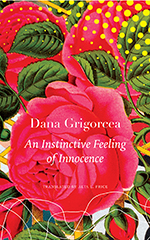He wanted to stand on a balcony and look out onto a grand boulevard. It was to be as massive as the one in Beijing or, even better, the one in Paris—a Romanian Champs-Élysées to replace the old boyars’ houses with their rotten roofs and unkempt gardens, wiping away the winding old alleyways where epidemics could break out at any moment. And so the entire city quarter of Uranus, atop Arsenal Hill, was demolished, whereupon the city’s 28-year-old chief architect—whose thesis had been devoted to the ‘urbanization of fallow lots’—gave her comrades the good news that they now had free space to work with, an area ‘as big as Venice’.
‘As big as Venice!’ one comrade or another must have swooned, ‘Venice!’
‘Bucharest’s Champs-Élysées’ had been known—or, more accurately, not known—as the Boulevard of Socialist Victory. It was slightly shorter than its Parisian forerunner but made up for it by being a full 8 metres wider.
Nicolae Ceausescu never had the chance to bow solemnly down from that balcony, so Michael Jackson did it in his stead, complete with glittering white glove. This was three years after Ceausescu’s execution, during Michael’s Dangerous World Tour.
Back then hardly anyone left home without their personal copy of his Dangerous cassette—people carried them around just like the Chinese kept Mao’s Little Red Book on hand during the Cultural Revolution. Everyone who owned a cassette player, like we did, would play ‘Jackson Poker’. You’d take a pencil or your finger and spin the tape to a random spot. Each player then had to guess what Michael would be singing when the music resumed. After everyone had placed their bets, the cassette was pushed into the recorder and the person whose guess was closest won the round.
I never knew
But I was living in vain
She called my house
She said you know my name . . .
I had two copies of the Dangerous cassette. I listened to one and kept the other hidden in a safe place, in case the first one broke. When CDs came along, my father bought me the album on CD, in case we ever managed to buy a CD player.
When it was announced that Michael would be brought directly to the People’s House upon landing in Bucharest, I was one of the seventy thousand fans who, under the dark of night, pushed their way into the concrete gorge between the nearby residential blocks, an area known as Via Mala. Before us loomed the steep rock wall of the monstrous building, still under construction. It, too, could have been a night of sorts—a black, starless night, behind which one would find only wasteland and fallow terrain. For the first time, I now stood in front of this building, a massif I had only ever seen at a distance, from the window on Dr Joseph Lister Street. And I probably never would have come here if it weren’t for Michael.
There were only a few sporadic shouts until the helicopters showed up, piercing the night with cones of light. The crowd’s shouts grew, ‘Michaaael, Miiichaaael,’ ropes were dropped from the helicopters, and everyone looked up to see if Michael was going to slide down to us amid the relentless autumn rain.
‘Is that him?’
‘That has to be him.’
But there was no one there.
We sang his songs to him, all mixed up. Sometimes a song sprang up from the back of the crowd and swept over us like a wave, bringing everyone’s voice upward and forward:
And it doesn’t seem to matter
And it doesn’t seem right
’cause the will has brought
No fortune
Still I cry alone at night
Don’t you judge of my composure
’cause I’m lying to myself
And the reason why she left me
Did she find in someone else?
And then another song welled up, initially sweeping the first one away, then bringing it back. This one was about love and betrayal, but above all betrayal, and everyone sang in unison:
(Who is it?)
Is it a friend of mine?
(Who is it?)
Is it my brother?
(Who is it?)
Somebody hurt my soul, now
(Who is it?)
I can’t take it ‘cause I’m lonely.
Out of nowhere the night exploded before us, with a roar and apocalyptic fireworks all around the People’s House.
‘It’s burning,’ a few people cried out, fascinated, ‘he’s going to burn it all down.’
The sound of sirens struck us from all sides.
There we stood at the foot of Arsenal Hill, mythical gathering place of ungodly might, a steaming mass of human beings, drenched to the bone yet strengthened, blessed by the suffering of our ancestors, the chosen few who’d experience the end of it all, the ultimate, decisive battle prophesied in the Book of Revelation. ‘And he gathered them together into a place called in the Hebrew tongue Armageddon.’
‘Michael, Michael,’ we called out to our archangel.
And when the entire People’s House had disappeared behind fire and smoke, someone shouted, ‘Down with the nomenklatura!’ Or it simply came over us all, and everybody began chanting, ‘Down with the nomenklatura!’
‘Free-dom, free-dom!’
Everyone stretched their arms out into the rain, their fingers forming the victory sign—much like the one democrats had flashed a year before, but now with index-finger and thumbs, no longer the V-sign made with the index and middle fingers used in the so-called revolution, since the nomenklatura’s cruel, gruesome spectacle had made us out to be the suckers.
Once the smoke had settled, washed away by the rain, we had a clear view of what was once the mere People’s House, and now revealed itself, in blue contours, to be the Heavenly People’s House, the House of all God’s People.
–Translated from the German by Alta L. Price
__________________________________
From An Instinctive Feeling of Innocence by Dana Grigorcea. Used with permission of Seagull Books. Translation copyright © 2019 by Alta L. Price.













